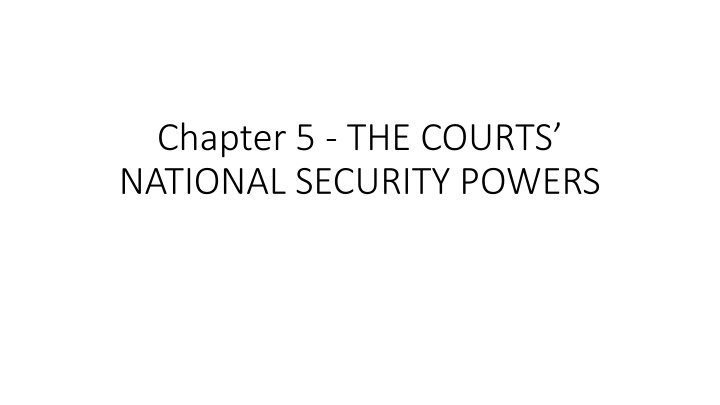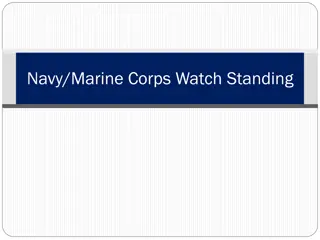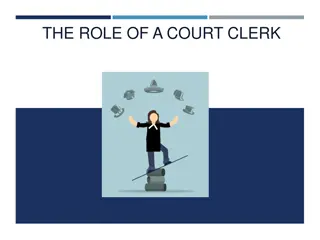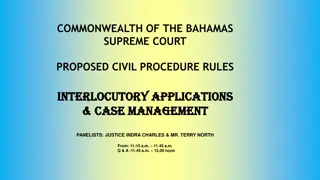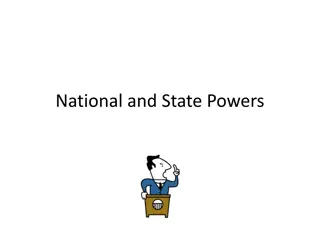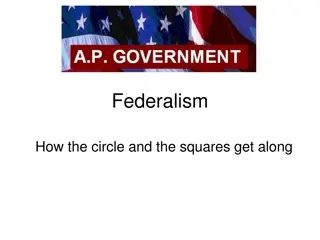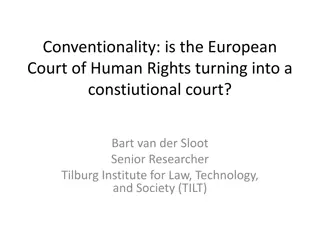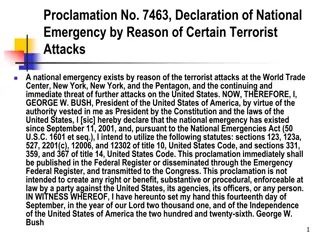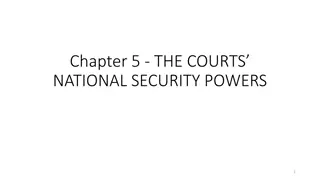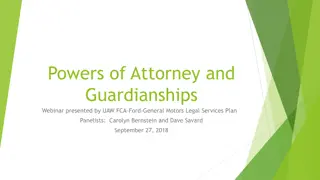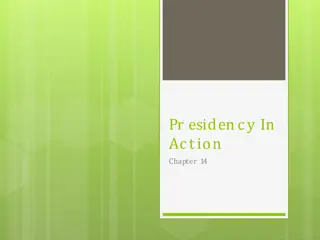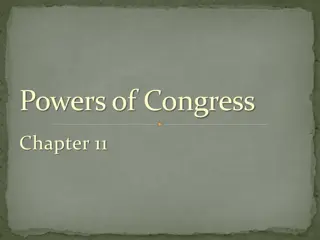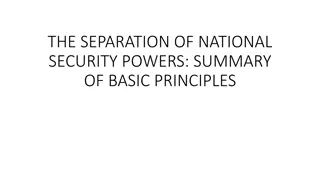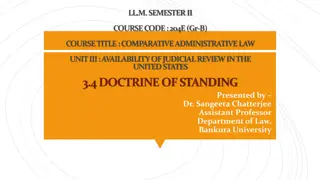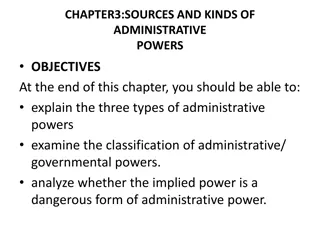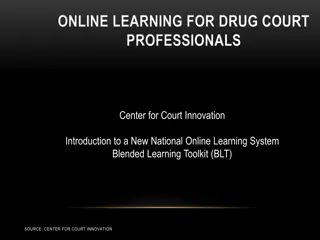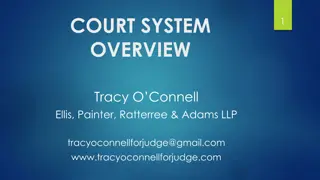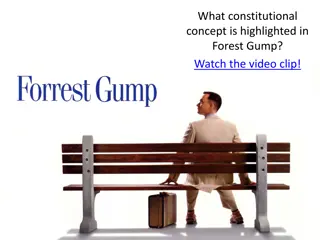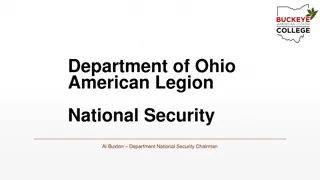National Security Powers: Standing and Review in Court
The complexities of national security cases in the courts, including standing requirements, political question doctrine, and judicial review of government actions related to national security. Key cases like Hamdi v. Rumsfeld and Washington v. Trump exemplify the balance between individual rights and security concerns.
Download Presentation

Please find below an Image/Link to download the presentation.
The content on the website is provided AS IS for your information and personal use only. It may not be sold, licensed, or shared on other websites without obtaining consent from the author.If you encounter any issues during the download, it is possible that the publisher has removed the file from their server.
You are allowed to download the files provided on this website for personal or commercial use, subject to the condition that they are used lawfully. All files are the property of their respective owners.
The content on the website is provided AS IS for your information and personal use only. It may not be sold, licensed, or shared on other websites without obtaining consent from the author.
E N D
Presentation Transcript
Chapter 5 - THE COURTS NATIONAL SECURITY POWERS
Basic Standing Still Applies in National Security Cases (1) suffered an injury in fact, (2) that is fairly traceable to the challenged conduct of the defendant, and (3) that is likely to be redressed by a favorable judicial decision. Lujan v. Defs. of Wildlife, 504 U.S. 555, 560-61 (1992) [I am assuming you learned basic standing in conlaw or adminlaw. I have posted review materials in the Resources.) This is complicated in national security cases by: Political question doctrine Sovereign immunity, unless waived Group versus individual injury (injury to all is injury to none) Pure claims of national security exceptionalism
Hamdi v. Rumsfeld, 316 f.3d 450 (4th Cir. 2003) Born in Baton Rouge, thus a US citizen. Allegedly captured on the battlefield in Afghanistan and detained as a terrorist. Government argued that his detention was unreviewable. The duty of the judicial branch to protect our individual freedoms does not simply cease whenever military forces are committed by the political branches to armed conflict. The Founders foresaw that troublous times would arise, when rulers and people would : : : seek by sharp and decisive measures to accomplish ends deemed just and proper; and that the principles of constitutional liberty would be in peril, unless established by irrepealable law. Ex parte Milligan, 71 U.S. (4 Wall.) 2, 120 (1866). While that recognition does not dispose of this case, it does indicate one thing: The detention of United States citizens must be subject to judicial review. [316 F.3d at 464.] The standards of the review are governed by Mathews v. Eldridge, an adlaw case that allows balancing due process against governmental interests and costs. (SC)
Washington v. Trump, 847 F.3d 1151 (9th Cir. 2017) Are National Security Related Immigration Actions Unreviewable? There is no precedent to support this claimed unreviewability, which runs contrary to the fundamental structure of our constitutional democracy. See Boumediene v. Bush, 553 U.S. 723, 765 (2008) (rejecting the idea that, even by congressional statute, Congress and the Executive could eliminate federal court habeas jurisdiction over enemy combatants, because the political branches lack the power to switch the Constitution on or off at will ). Within our system, it is the role of the judiciary to interpret the law, a duty that will sometimes require the [r]esolution of litigation challenging the constitutional authority of one of the three branches. Zivotofsky ex rel. Zivotofsky v. Clinton, 566 U.S. 189, 196 (2012) (quoting INS v. Chadha, 462 U.S. 919, 943 (1983)). : : : It would indeed be ironic if, in the name of national defense, we would sanction the subversion of one of those liberties : : : which makes the defense of the Nation worthwhile. ); Zemel v. Rusk, 381 U.S. 1, 17 (1965) ( [S]imply because a statute deals with foreign relations [does not mean that] it can grant the Executive totally unrestricted freedom of choice. ). : : : [847 F.3d at 1161-1163.
Deferential Review In view of the knowledge, experience and positions held by the three [government] affiants regarding military secrets, military planning and national security, their affidavits were entitled to the utmost deference. Taylor v. Dep t of the Army, 684 F.2d 99, 109 (D.C. Cir. 1982) With no statute or regulation directly on point as guidance, the court has no standard for the review. This is often the case in national security law. The default in national security is deferential review.
Is the Court a Reliable Protector of Rights? Korematsu v. United States, 323 U.S. 214 (1944), upholding the exclusion of persons of Japanese ancestry (including U.S. citizens) from West Coast military areas out of deference to military judgment during World War II Roman Catholic Diocese of Brooklyn v. Cuomo, 141 S. Ct. 63 (2020), limiting the power of the state to protect against the spread of the COVID virus and overturning 200 years of precedent that held that churches did not have special standing to resist public health orders.
Smith v. Obama Plaintiffs Claims The Plaintiff, Nathan Michael Smith, was deployed to Kuwait on an intelligence mission in Operation Inherent Resolve, the military campaign against the Islamic State of Iraq and the Levant (ISIL) initiated by the United States and its allies in 2014. He sought a declaration that the Operation was unlawful because Congress had not authorized it. Plaintiff also claims that the Take Care Clause requires President Obama to publish a sustained legal justification for Operation Inherent Resolve to enable Plaintiff to determine for himself whether this military action is consistent with his oath to preserve and protect the Constitution. The court reviews the argument that the war was justified under AUMF, but this is not necessary to resolve the case.
Standing and the Political Question The Court notes that the standing inquiry is especially rigorous when reaching the merits of the dispute would force [the Court] to decide whether an action taken by one of the other two branches of the Federal Government was unconstitutional. Raines v. Byrd, 521 U.S. 811, 819-20 (1997). Is this at issue to the extent that Plaintiffs claim depend on the President violating the War Powers Resolution? If the War Powers Resolution requirement of Congressional action is unconstitutional, it cannot be a basis for the Plaintiff s claims. The court will not want to resolve this unless necessary.
Plaintiff Fails to Raise Traditional Standing Injuries in Military Action Cases : : : Plaintiff does not allege the traditional types of injuries one might expect a service person challenging the legality of military action to allege. Plaintiff does not allege that he suffers any injury in the form of physical or emotional harms, or the risk thereof, associated with deployment to a theatre of combat. He also does not allege that he has been involuntarily forced to participate in a military action in violation of his own constitutional rights or liberties. And he does not allege that he has any moral or philosophical objections to the military action against ISIL. Indeed, Plaintiff has no qualms about participating in a fight against ISIL, and his lawsuit does not seek to relieve him of his obligation to do so. : : :
Plaintiffs Injuries First, Plaintiff alleges that he suffers legal injury because, to provide support for an illegal war, he must violate his oath to preserve, protect, and defend the Constitution of the United States. In addition, Plaintiff alleges that he is at risk of being punished for disobeying legally-given orders. : : : Are these concrete and particularized in Lujan sense? Is legal injury a legitimate substitute for action injury? Is the fear of future punishment for a chance of being required to violate an order sufficiently concreted? The court could have ended the case without any further discussion.
Little v. Barreme Does Not Require Plaintiff to Disobey Orders Little stands for the proposition that a federal official [is] protected for action tortious under state law only if his acts were authorized by controlling federal law. Qualified immunity set a high bar for proving that the officer knew or should have known that the actions were illegal. To the contrary, it appears well-settled in the post-Little era that there is no right, let alone a duty, to disobey military orders simply because one questions the Congressional authorization of the broader military effort.
When Can Must You Disobey an Order? The duty to disobey an unlawful order applies only to a positive act that constitutes a crime that is so manifestly beyond the legal power or discretion of the commander as to admit of no rational doubt of their unlawfulness. In theory, this is to end the Nuremberg Defense Just following orders. In practice, in the US legal system, if someone in authority tells you that what you are doing is OK, you can probably dodge criminal liability because you thought that committing war crimes was not really committee war crimes.
Plaintiff Does Not Have Standing Under the Oath of Office Cases These cases generally stand for the proposition that an official who has taken an oath to support the Constitution has standing to challenge a government action if he or she is then forced to choose between violating the Constitution and facing concrete harm. Who is really violating his oath of office, if the Plaintiff is right about the War Powers Resolution? [T]he alleged violation of the War Powers Resolution in this case is based solely on the alleged actions, or lack thereof, of President Obama, not Plaintiff. The same is true with regard to the alleged violation of the Take Care Clause. : : : Even accepting his allegations as true, he is not himself being ordered to violate the Constitution, and therefore his oath
Injury Claims in the Vietnam War Cases In the cases referred to by Plaintiff, plaintiff-service members claimed that they were being forced to fight in violation of their constitutional rights, and the injuries that they alleged were the deprivation of liberty and the risk of injury or death. See Berk, 429 F.2d at 304 (soldier ordered to dispatch to Vietnam alleging violations of his constitutional rights could bring suit challenging legality of war where the complaint can be construed as putting in controversy his future earning capacity, which serious injury or even death might diminish by an amount exceeding $10,000 ); Massachusetts v. Laird, 451 F.2d at 28 (soldiers serving in Southeast Asia had standing to challenge Vietnam War where [t]hey allege[d] that their forced service in an undeclared war is a deprivation of liberty in violation of the due process clause of the Fifth Amendment ). : : :
Plaintiff Does Not Allege Physical or Individual Liberty-Based Injuries Finally, the Court rejects Plaintiff s argument that the decisions in cases brought by service members challenging the Vietnam War further confirm [Plaintiff s] standing. To be sure, such cases do stand for the proposition that service men and women ordered into a war that they contend is illegal may have standing to challenge that war, and the Court finds the reasoning of those cases logical and persuasive. [While those soldiers got standing, they were not found to have a redressable claim and their cases were dismissed. No one got relief, only standing. That was also a more sympathetic court.]
Clapper v. Amnesty International USA, 568 U.S. 398 (2013) Human rights workers, labor union leaders, and journalists sought an injunction against secret, warrantless electronic surveillance of them, claiming violations of their First and Fourth Amendment rights. Because the plaintiffs were unable to obtain or present evidence that they were actually targeted for surveillance, however, the Supreme Court ruled that any injuries were too speculative to confer standing. Instead, they had to show that their imminent injury was certainly pending. Basically, they had to show that they were being personally surveilled, which they could only prove if they could get discovery which the court would never grant.
What if Your Client is on the Kill List? foreign journalist alleged that the Trump administration had included him (on the basis of metadata from his communications, writings, social media postings, and travel) on SKYNET, [not that SKYNET] a classified list of potential terrorists, and that he was therefore probably on the kill list for targeted killing as well. The court held that: [w]hile it is possible that there is a correlation between a list like SKYNET and the Kill List, the Court finds no allegations in the Complaint that raise that possibility above mere speculation. Accordingly, the Court finds Mr. Zaidan has failed to allege a plausible injury-infact and therefore has no standing to sue. Same Clapper problem you cannot get discovery, so no proof.
Injuries by Illegally Supplied US Proxies Suppose, for example, that an American who had been injured in Yemen by a Saudi air raid sued the President and other executive branch defendants for supplying military aid to the Saudi Air Force in violation of a statutory ban on military assistance to Saudi Arabia. Even if he sufficiently asserted a concrete and particularized injury, a court might well rule that it was not caused by the defendants and not redressable by an injunction, because the Saudis could continue their air campaign in Yemen without U.S. aid.
Taxpayer or Citizen Standing In Pietsch v. Bush, 755 F. Supp. 62 (E.D.N.Y. 1991), a citizen sought a court order preventing hostilities between the United States and Iraq before the 1991 Gulf War. According to the court, Pietsch s claim that he was being made an accessory to murder against his will, a compulsion causing him emotional distress, was too abstract to meet Article III requirements. Id. at 65-66. Indeed, with one equivocal exception, see Flast v. Cohen, 392 U.S. 83 (1968) (recognizing the standing of taxpayers to bring certain types of claims that government spending violates the Establishment Clause), the Supreme Court has generally rejected citizen or taxpayer standing even where no one would otherwise have standing to enforce the Constitution.
Congressional Standing You might get standing if you are denied the chance to vote by the President going to war without your authorization, but maybe not since this was mooted by a vote to support the President. Dellums v. Bush, 752 F. Supp. 1141 (D.D.C. 1990). You do not get standing to oppose something that you voted against and lost. Probably kills Dellums. Raines v. Byrd, 521 U.S. 811, 829 (1997). Once again, litigation is not a substitute for a losing vote in Congress. Campbell v. Clinton, 52 F. Supp. 2d 34 (D.D.C. 1999), aff d, 203 F.3d 19 (D.C. Cir. 2000).
United States House of Representatives v. Mnuchin, 976 F.3d 1 (D.C. Cir. 2020) - Standing The House sued Trump, claiming he violated the Appropriations Clause by using unappropriated money on the border wall. We already looked at the Appropriation Clause arguments. The question: whether a single house of a bicameral legislature can ever have standing to litigate an alleged injury to its legislative prerogative distinct from the institutional standing of the entire legislature to litigate an institutional injury to the body as a whole. To put it simply, the Appropriations Clause requires two keys to unlock the Treasury, and the House holds one of those keys. The Executive Branch has, in a word, snatched the House s key out of its hands. That is the injury over which the House is suing.
Does Snatching the Key give the House Standing? Administration argues that it should take both houses for standing, since it takes both houses to pass a bill. But what about the House s unilateral right to start spending bills, which means that if the House does not want money spent, the Senate cannot originate the bill and spend the money? The alleged Executive Branch action cuts the House out of the appropriations process, rendering for naught its vote withholding the Executive s desired border wall funding and carefully calibrating what type of border security investments could be made. The injury, in other words, zeroe[s] in on the House.
Why is the Appropriations Clause So Important? t. To hold that the House is not injured or that courts cannot recognize that injury would rewrite the Appropriations Clause. That Clause has long been understood to check the power of the Executive Branch by allowing it to expend funds only as specifically authorized. As then-Judge Kavanaugh wrote for this court, the Appropriations Clause is a bulwark of the Constitution s separation of powers among the three branches of the National Government, and it is particularly important as a restraint on Executive Branch officers. Remember, the only tools Congress has against an errant President is to cut off funding or impeach him.
The Houses Injury For that reason, expenditures made without the House s approval or worse, as alleged here, in the face of its specific disapproval cause a concrete and particularized constitutional injury that the House experiences, and can seek redress for, independently. And again, failure to recognize that injury in fact would fundamentally alter the separation of powers by allowing the Executive Branch to spend any funds the Senate is on board with, even if the House withheld its authorizations. This will be another shadow docket case that will likely be mooted without a final decision.
Political Questions Even if you get standing, you will seldom get a ruling.
Political Question Review: Baker v. Carr, 369 U.S. 186, 217 (1962) [1] a textually demonstrable constitutional commitment of the issue to a coordinate political department; or [2] a lack of judicially discoverable and manageable standards for resolving it; or [3] the impossibility of deciding without an initial policy determination of a kind clearly for nonjudicial discretion; or [4] the impossibility of a court s undertaking independent resolution without expressing lack of the respect due coordinate branches of government; or [5] an unusual need for unquestioning adherence to a political decision already made; or [6] the potentiality of embarrassment from multifarious pronouncements by various departments on one question. 26
Political Question Analysis How many do you need to make a case a political question? The constitution leaves setting immigration policy to Congress: Why wasn t I.N.S. v. Chadha, 462 U.S. 919 (1983) dismissed as a political question? Violations of the Constitution are not political questions. How does the standard for judging what is a political question resemble a mandamus proceeding? The key to mandamus is that there must be no discretion. The Court will not order the President to stop a national security action unless it is clearly outside his discretion. Lawyering tip: mandamus is almost never what your client needs. 27
Smith v. Obama The Political Question Plaintiff is asking the Court to interpret both the War Powers Resolution and Constitutional war making authority and find that the President is acting illegally. My only question continues to be why this was not a summary dismissal. For the reasons set out below, the Court finds that these are political questions under the first two Baker [v. Carr, 369 U.S. 186 (1962)] factors: the issues raised are primarily ones committed to the political branches of government, and the Court lacks judicially manageable standards, and is otherwise ill-equipped, to resolve them. Note if it is a political question, no one can litigate it.
Why War Powers are Always Political Questions There can be no doubt that decision-making in the fields of foreign policy and national security is textually committed to the political branches of government. It would be difficult to think of a clearer example of the type of governmental action that was intended by the Constitution to be left to the political branches : : : [than the] complex, subtle, and professional decisions as to the : : : control of a military force. : : : ; The fundamental division of authority and power established by the Constitution precludes judges from overseeing the conduct of foreign policy or the use and disposition of military power; these matters are plainly the exclusive province of Congress and the Executive. .
Ripeness The Final Hurdle to Stopping Presidential War Making In February 2003, active-duty members of the military, parents of military personnel, and members of Congress sued to enjoin the President from initiating a war against Iraq. Doe v. Bush, 323 F.3d 133 (1st Cir. 2003). The plaintiffs argued that Congress and the President are in collision that the President is about to act in violation of the October Resolution Ripeness doctrine involves more than simply the timing of the case. It mixes various mutually reinforcing constitutional and prudential considerations. One such consideration is the need to prevent the courts, through avoidance of premature adjudication, from entangling themselves in abstract disagreements. Another is to avoid unnecessary constitutional decisions. A third is the recognition that, by waiting until a case is fully developed before deciding it, courts benefit from a focus sharpened by particular facts. The case before us raises all three of these concerns.
Suing The Federal Government for Damages 31
Non-Damage Claims Injunctive relief most of what we see in cases challenging national security actions. Brought under the Administrative Procedure Act and/or the Constitution. Injunctions are prospective, to stop future wrongdoing. Injunctions do not involve individualized determinations of injury and compensation, and thus are not specific to the plaintiffs before the court, thus they can be resolved on the law without extensive discovery and testimony. They do not raise sovereign immunity questions. 32
Private Individuals and Foreign Governments 33
Getting Jurisdiction If there is a nexus to the United States, you can get into court through ordinary tort law. This is subject to the national security override we saw in Dames v Moore if the President finds that a judgement against a foreign government or foreign national interferes with foreign policy. If there is no nexus with the United States that will suffice under tort law, then you need a statute. 34
Statutes Granting Jurisdiction to Sue Foreigners over National Security Issues Antiterrorism Act, 18 U.S.C. 2333 (2012 & Supp. V 2017) (creating a civil damages claim for U.S. nationals injured by reason of an act of international terrorism) Torture Victim Protection Act, Pub. L. No. 102-256, 106 Stat. 73 (1992) (codified at 28 U.S.C. 1350 note (2012)) (providing a civil remedy for victims of torture or extrajudicial killing) Alien Tort Statute, 28 U.S.C. 1350 (2012) Subject to strict limitations. 35
Claims for Damages under FISA Foreign Intelligence Surveillance Act (FISA), 50 U.S.C. 1810 (2012) (creating a cause of action for individuals who are aggrieved by certain unlawful searches under FISA). This appears to be limited to suing individuals who act unlawfully: The threshold issue in this appeal is whether the district court erred in predicating the United States' liability for money damages on an implied waiver of sovereign immunity under 1810. It is well understood that any waiver of sovereign immunity must be unequivocally expressed. Section 1810 does not include an explicit waiver of immunity, nor is it appropriate to imply such a waiver. Al- Haramain Islamic Found., Inc. v. Obama, 705 F.3d 845, 848 (9th Cir. 2012) 36
Suing the United States for Money Damages 38
Tort Damage Claims Traditional Sovereign Immunity US Constitution "No Money shall be drawn from the Treasury, but in Consequence of Appropriations made by Law." U.S. Const. art. I, 9. No jurisdiction to sue in court. All compensation had to be by private bills What problems do private bills pose?
Constitution Claims for Damages Takings under the 5th Amendment. Money owed through contracts with the United States. May be difficult to collect if you need classified information to prove the contract exists. Originally paid by special bills in Congress. 40
Court of Claims 1855 Contracts, tax refunds, takings - not torts Administrative tribunal to review claims and make recommendations to Congress Later Congress made the decisions binding Not an Art III court - like bankruptcy courts Appeal to the Federal circuit and the United States Supreme Court. Federal Circuit recently disposed of the Takings Claims against the Corps of Engineers for the flooding caused by Hurricane Katrina.
Suing State Officials 42 USC 1983, part of the post-Civil War civil rights laws, allows persons who violate an individual s civil rights, while acting under the color of state law, to be sued in federal court. Thus, Congress authorized suing state officials for violating an individual s constitutional rights 100 years before the Supreme Court allowed the same claims to be made against federal officials.
Federal Tort Claims Act Passed in 1946 All torts were private bills before then Tied up Congress and encouraged corruption Limited waiver of sovereign immunity to allow tort claims Congress appropriates a fund to pay the claims Since there is no federal common law of torts, the agency and court look to the law of the state where the tort occurred for the prima facie case for the tort. This is a waiver in derogation of sovereign immunity. This means that it is strictly construed: If you do not meet the letter of the statute, sovereign immunity is not waived, and you have no jurisdiction to sue. Louisiana abolished sovereign immunity, so if you fall outside the LA Tort Claims Act, you can sue with fewer limits than being under the Act.
Administrative Review of Claims Action under the FTCA - Sec 2672 The head of each Federal agency ... may consider, ascertain, adjust, determine, compromise, and settle any claim for money damages against the United States for injury or loss of property or personal injury or death caused by the negligent or wrongful act or omission of any employee of the agency while acting within the scope of his office or employment, under circumstances where the United States, if a private person, would be liable to the claimant in accordance with the law of the place where the act or omission occurred You do not litigate your tort directly in court, you litigate the agency s failure to provide administrative compensation for your tort. This is though to make it impossible to maintain FTCA class action litigation. 45
Exceptions to the FTCA - 28 USC Sec 2680 http://biotech.law.lsu.edu/cases/immunity/ftca_exceptions.htm (h) originally did not include the provision for law enforcement officers. Thus, individuals who were injured by negligent federal officials could recover damages, but persons who were intentionally and wrongfully injured could not. This inconsistency drove the Supreme Court to issue the Biven ruling. 46
Bivens v. Six Unknown Named Agents, 403 U.S. 388 (1971) Bivens is a direct action against federal employees for violations of constitutional rights. The Court in Bivens recognized the injustice of allowing compensation for negligent injuries cause by federal government employees, but not for those caused by intentional wrongdoing. Bivens is a personal action, not an official capacity action. If you are in the course and scope, you are immune under Bivens and must be sued, if possible, under the FTCA. This means that you can only sue people up the chain of command if you can show they personally knew about and directed the unconstitutional actions of the front-line officers. 47
The Limited Actions Allowed Under Bivens Bivens itself is a 4th amendment claim based on an illegal search and arrest. Davis v. Passman Davis held that an administrative assistant was entitled to sue a congressman for sex discrimination in violation of the equal protection principles embodied in the Fifth Amendment for money damages. Carlson v. Green In Carlson, the Court held that a prisoner s estate was entitled to a Bivens remedy for improper medical treatment, in violation of the Eighth Amendment s prohibition on cruel and unusual punishment. Davis and Carlson were both decided in 1979. While the court has upheld Biven s claims after these cases, it has required plaintiffs to show how their claim fits under one of these three cases. The court has recently indicated that it is unlikely to extend Bivens and refused to do so in the Hernandez cross border shooting case. It is waiting for Congress to act. After Bivens, Congress amended the FTCA to include intentional conduct by federal law enforcement officials, which dramatically limited Bivens type claims in those cases. Congress could further amend the FTCA to include intentional actions by other federal employees.
Qualified Immunity: Harlow v. Fitzgerald, 457 U.S. 800 (1982) The Court ruled that government officials performing discretionary functions should be protected from liability for civil damages if their conduct does not violate clearly established statutory or constitutional rights of which a reasonable person would be aware. Those who are plainly incompetent or who knowingly violate the law cannot invoke qualified immunity. Qualified immunity applies to Bivens actions, but more importantly, it applies to actions against state officials and police under 42 USC 1983. It is irrelevant to FTCA claims, since those are against the Government, not individuals. 49
The Policy Rationale for Qualified Immunity Qualified immunity balances two important interests the need to hold public officials accountable when they exercise power irresponsibly and the need to shield officials from harassment, distraction, and liability when they perform their duties reasonably. The protection of qualified immunity applies regardless of whether the government official s error is a mistake of law, a mistake of fact, or a mistake based on mixed questions of law and fact. Pearson v. Callahan, 555 U.S. 223 (2009) What would be a Mathews analysis? The government gets to make mistakes if preventing the mistakes would be at too high a cost. Does litigation only cost when the defendant loses? Will government employees be reticent to make difficult decisions if they are worried about liability? Why is there a strong policy for summary judgment in 1st amendment news cases? The same policy applies to qualified immunity. 50
